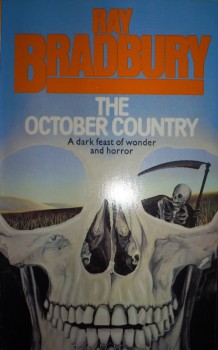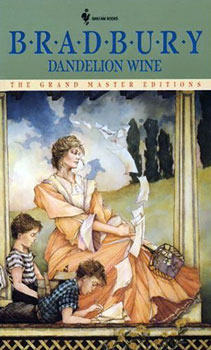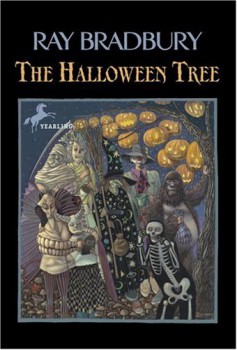A Brief Tribute to the Stories of Ray Bradbury
 I came to Ray Bradbury at what is likely a later age than most. I never had to read Fahrenheit 451 in school; if I read one of his short stories as a student I have no recollection. Several years ago, in a desire to start filling in some gaps I had in classic genre fiction, I gave Fahrenheit 451 a try. It was a powerful read and made a profound impact on me. It prompted me to seek out more Bradbury—and I’ve been hooked ever since.
I came to Ray Bradbury at what is likely a later age than most. I never had to read Fahrenheit 451 in school; if I read one of his short stories as a student I have no recollection. Several years ago, in a desire to start filling in some gaps I had in classic genre fiction, I gave Fahrenheit 451 a try. It was a powerful read and made a profound impact on me. It prompted me to seek out more Bradbury—and I’ve been hooked ever since.
Since then I’ve marveled in the wonders of Dandelion Wine, The Golden Apples of the Sun, The October Country, The Halloween Tree, Something Wicked This Way Comes, and The Martian Chronicles. If somehow you haven’t read any Bradbury yet, my advice is to pick any of the above titles and dive in. I’d recommend one over the others, but there’s no need. They’re all pretty much brilliant. You won’t be disappointed.
I’ve always been a little leery of science fiction and have read far more deeply of fantasy. Rightly or wrongly, my perception is that SF worships at the altar of technology, and is fixated upon cold, clinical subject matter for which I have little interest. But if the genre contained more books like The Martian Chronicles, I might view it a lot differently (a parenthetical aside: Though it may be the subject of a catchy song, to call Bradbury “the greatest sci-fi writer in history” isn’t accurate. Dark fantasy, horror, soft sci-fi, traditional literary fiction—Bradbury has written in them all, and sometimes all at once. He is in many ways genre-defying). Bradbury’s stories are in tune with our humanity and his fiction is life-affirming. They remind us that We’re human, and we’re alive, damn it. Bradbury often said that he loved life and was driven to write not only by his love of libraries and of reading, but of the very act of living itself. And that’s potent fuel for a lifetime of stories.
 Bradbury’s books aren’t really about plot as much as they are about places and people, images and things. I recall an interview with Bradbury in which he described beginning his stories using a process of word-association, thinking of a word or series of words and building a story from that. This technique plays out wonderfully in Dandelion Wine, whose images become burned into your memory as if you lived them yourself. The old arcade, and the coin-operated gypsy fortune teller. The ravine. Mr. Jones’ traveling junk wagon. Bradbury treats us to several beautiful, stirring, and instructive vignettes throughout Dandelion Wine, including the story of Leo Auffman, a man who tries to build a Happiness Machine only to have his wife Lena break down in tears after using it:
Bradbury’s books aren’t really about plot as much as they are about places and people, images and things. I recall an interview with Bradbury in which he described beginning his stories using a process of word-association, thinking of a word or series of words and building a story from that. This technique plays out wonderfully in Dandelion Wine, whose images become burned into your memory as if you lived them yourself. The old arcade, and the coin-operated gypsy fortune teller. The ravine. Mr. Jones’ traveling junk wagon. Bradbury treats us to several beautiful, stirring, and instructive vignettes throughout Dandelion Wine, including the story of Leo Auffman, a man who tries to build a Happiness Machine only to have his wife Lena break down in tears after using it:
Sunsets we always liked because they only happen once and go away.
But Lena, that’s sad.
No, if the sunset stayed and we got bored, that would be a real sadness.
Bradbury’s moral? Joy cannot exist without sadness. Without a contrast or a break, joy becomes routine and expected, and therefore paradoxically joyless and hollow. Permanent happiness is not our lot in life, but that’s the way things are meant to be.
One of Dandelion Wine’s central themes is that the world needs magic. When we try to classify and explain and categorize too much, the magic is drained away. When an unhelpful aunt arrives from out of town and immediately sets to work “helping” the grandmother, a wondrous cook, by cleaning up her messy kitchen and neatly setting to order all her mysterious, unlabelled spices and ingredients, the grandmother grows unhappy and her cooking suffers. When the family sends the aunt packing and returns the kitchen to its natural state of disorder and mystique, the grandmother’s meals are restored to their former exquisite state. I like that message. Human beings operate in the realms of faith and mystery, not just cold, clinical materialism.
Bradbury was also a master of the horror story—not merely the nasty, brutal shocks of E.C. Comics (though he actually had several stories adapted for its line of horror and science fiction), but of an atmospheric, unsettling horror that remains with you long after the tale ends. “There Will Come Soft Rains” is about a futuristic home that continues to operate after its inhabitants are incinerated in the bright flash and unimaginable heat of a nuclear blast. Although mutual nuclear annihilation does not seem as likely these days, having grown up in the 80s against the backdrop of Red Dawn and Wargames and imminent war with the Soviet Union, I identified strongly with this story. It still haunts me to this day. As a father of two young daughters I was likewise profoundly disturbed by “The Lake,” a semi-autobiographical account from Bradbury’s youth about a young girl who goes swimming at a busy beach and fails to surface. “The Crowd” is just plain creepy, even more so because its subject matter—a group that appears out of nowhere to gawk at catastrophes—is all too familiar to anyone who’s ever driven past a roadway accident, or observed the grist of an average nightly local news broadcast and its predilection with human misery and suffering.
 Bradbury had a few common themes he returned to again and again in his stories, including our impending mortality and finding meaning in our finite lives. In The Halloween Tree, Bradbury takes us out with a group of kids on Halloween, and along the way reveals the history of this incongruous oddity of a holiday. We learn its origins as an ancient ritual spanning multiple cultures and thousands of years, a night denoting the end of the harvest season and the onset of winter, symbolic of endings and of death. “Four thousand years ago, one hundred years ago, this year, one place or time, but the celebration’s all the same—the Feast of Samhain, the Time of the Dead Ones, All Souls, All Saints, the Day of the Dead, El Dia de los Muertos, All Hallows, Halloween,” Bradbury wrote.
Bradbury had a few common themes he returned to again and again in his stories, including our impending mortality and finding meaning in our finite lives. In The Halloween Tree, Bradbury takes us out with a group of kids on Halloween, and along the way reveals the history of this incongruous oddity of a holiday. We learn its origins as an ancient ritual spanning multiple cultures and thousands of years, a night denoting the end of the harvest season and the onset of winter, symbolic of endings and of death. “Four thousand years ago, one hundred years ago, this year, one place or time, but the celebration’s all the same—the Feast of Samhain, the Time of the Dead Ones, All Souls, All Saints, the Day of the Dead, El Dia de los Muertos, All Hallows, Halloween,” Bradbury wrote.
Bradbury’s stories are comfortable with the mystery of death, and although many are suffused in darkness and uncertainty they never descend into outright nihilism or despair. When one of the boys in The Halloween Tree asks “Will we ever stop being afraid of the night and death?” the spectral Moundshroud (who may be death himself) replies:
“When you reach the stars, boy, yes, and live there forever, all the fears will go, and death himself will die.”
The world is an emptier place without Bradbury in it, but he has achieved immortality in his stories, and we can take comfort that he now resides among the stars.
You should also read The Illustrated Man and Long After Midnight as well as the mysteries in A Memory of Murder. And if you don’t have them, try to find copies of his two 100 story collections, The Stories of Ray Bradbury and Stories.
I guess it is a sign of my age that I was never “forced” to read Bradbury in school. Bradbury was what you read as an antidote to what you were “forced” to read. I once taught a college freshmen writing course in which essays were based on various short stories, and since Bradbury was in the assigned textbook, I couldn’t help but “teach” it. I remember at one point telling the class that I didn’t want to ruin the story for them by dissecting it in English class, so they were free to just enjoy it and tell me what they thought.
BTW: While I agree that however you classify Bradbury, science fiction is inaccurate. However, I would disagree that science fiction worships at the feet of technology. Frequently, it warns us to be, if not leery, at least aware of technology’s perils. This tradition dates back to Frankenstein. Actually, Bradbury did worship technology, the difference being it was the technology of the 1950s he worshipped.
Brian,
Like you, I came to Bradbury late, mostly in the past decade. I did read some of his tales during high school – specifically, I recall reading “The Fall of the House of Usher 2” when we were studying Poe.
I consumed a few of his books via audio. There was even a collection of stories read by Bradbury himself. Those are great, if you can find them. (it was a library cassette book)
“There Will Come Soft Rains” haunts me, too, and probably for the exact same reasons as you – child of the Cold War.
An interesting story about EC Comics: When his first story (I believe it was “The Black Ferris”) got adapted as a comic; the publishers basically just did a comic version of the story without ever asking for permission from the author. The reasoning seemed to be that a big-deal writer like Ray Bradbury would never bother reading comics, so he’d never know.
But Bradbury was a huge comic fan and did come across the issue, recognizing it as an adaptation of one of his stories immediately. So he sent a letter to EC Comics. Now when the publishers found out, they were scared that Bradbury was going to sue them out of business for adapting his story without permission.
Instead, he tells them that he liked the adaptation and just wanted to point out that they forgot to credit him as the original author. He made the whole thing sound as if they’d made a little mistake rather than committed a crime. He also gave his permission for further adaptations.
Nice guy. Great storyteller.
westkeith: Thanks for the suggestions. It’s sad that there won’t be any more Bradbury short story collections or novels, but I’m glad that I have a lot more unread material to work through. In fact (and truthfully) I had just bought a used copy of “R is for Rocket” last week.
Soyka: When I was in high school I believe half the English classes had to read Brave New World while others read Fahrenheit 451. I read the former. I’m sure you’re right about SF: I haven’t read a lot of it, though lately I’ve read Enders Game, 2001, and Lord of Light, and enjoyed it all.
Bradbury himself seemed to have an equivocal view of technology: He was certainliy an optimist and believed that we were progressing as a species, but he also stated in no uncertain terms that technology needed to be coupled with restraint, and that computers were causing us to lose some vital element of our humanity. He didn’t like automobiles very much either.
Paul, I borrowed a copy of Fahrenheit 451 from my local public library (Bradbury would have approved) read by Bradbury himself. Sheer excellence.
MichaelPenkas: I hadn’t heard that story: Great stuff, and very revealing of Bradbury the man.
Bradbury’s death is beyond sad, but from a spiritual point you just can’t help but feel that his real legacy is just beginning. I’m paraphrasing, of course, but he once said something along the lines that “All of life is a rehearsal for death.”
One might ponder the conversations he’d be having with all the colleagues he knew from decades past. Mr. Electrico, for example. There’s also the fate of his extensive collection of vintage books, pulp magazines, movie memorabilia and the like. They’ll probably stay with his family, but sometimes collectors will them to museums.
Zen In the Art Of Writing.
[…] A-brief-tribute-to-the-stories-of-ray-bradbury […]